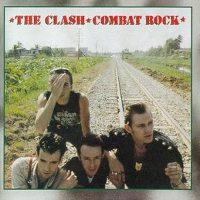â€THIS IS A PUBLIC SERVICE ANNOUNCEMENT…. WITH GUITAR!â€
Joe Strummer kicks off The Clash’s 1982 album Combat Rock with this enthusiastic declaration, followed the song “Know Your Rights†which shows what The Clash do best--take in-your-face political lyrics and give them even more power with that taut, unbreakable pulse of rhythm section Paul Simonon and Topper Headon, supplemented with minor chord stabs from the guitars of Mick Jones and Joe Strummer. It’s unfortunate that the group couldn’t keep up this level of energy throughout their last “proper†album, going out with a whimper with the “record that shall not be named†that came after the departure of Jones and Headon.
On the surface, Combat Rock seems like a simple record, especially when placed in succession with the masterpiece double LP London Calling and the sprawling, spotty but undoubtedly ambitious triple LP Sandinista! Intended to be another double LP titled Rat Patrol from Fort Bragg, Combat Rockended up taking them back to the single LP format, for better and for worse.
For better: It allows the essential and best songs to float to the top instead of sinking into the depths of a double or triple LP tracklist. Kickass songs like “I’m Not Down†got buried on side D of London Calling, but Combat cuts right to the best stuff right off the bat. The hits, “Should I Stay Or Should I Go,†and “Rock the Casbah†are given the 3rd and 4th spots in the lineup, just like any good batting order. Buoyed by these singles, Combat Rock was The Clash’s biggest selling album, going all the way to #2 on the UK charts and landing at #7 in the US. “Straight to Hell,†the end of side A, is propelled by auxiliary bossa-nova inspired percussion and an insistent fiddle line floating over top. It shines light on forgotten people, like immigrants and the unemployed working classes, people that are forgotten by the rich and privileged. The classic song was given a second life by way of the prominent sample that M.I.A. used in her 2007 hit “Paper Planes.†Kicking off side B, “Overpowered By Funk†is an incredibly fun track, one of The Clash’s best dance tracks thanks in no small part to the sassy, squiggly synths played by Poly Mandell. While it points itself towards funk right in the title, the song is firmly entrenched in the emerging hip hop genre, which would take these strong grooves and sassy synthesizer lines and absorb them, with the addition of the bridge rapped by Futura 2000.
For worse: Just as the great songs stand out more, so do the weak ones. Cut down from the originally planned 18 tracks, the 12 that remained still contained some clunkers. Side B has weak songs outnumbering the great ones. “Sean Flynn†meanders about without a care, its wobbly bass and fluttering flutes a remnant from the artsy misfires of Sandinista. “Ghetto Defendant†may seem more lyrically powerful with Allen Ginsburg’s poetry in there, but damn if I didn’t wish they had left that out and added more song to the damn track. “Inoculated City†attempts to save the side with Headon’s always-fantastic hi hat work giving an upbeat feel, but it doesn’t have the bite of their early punk days, or the joyous feel of London Calling’s uptempo numbers. It doesn’t go much of anywhere. “Death is a Star†ends the album with the ignorable piano of a fancy hotel lobby, rather than with the piss and vinegar The Clash I love provided in spades throughout their career. As my iTunes sends this track directly into “Safe European Home†to start off Give ‘Em Enough Rope, I decide to let it play rather than return to Combat.
With all that said, Combat Rock has some of the best songs Clash ever put to tape, not to mention songs that likely introduced a whole new wave of people to the band thanks to the radio hits. It’s essential in any Clash fan’s collection, but it also shows a band at odds with itself, and members wanting to do their own thing.Â
